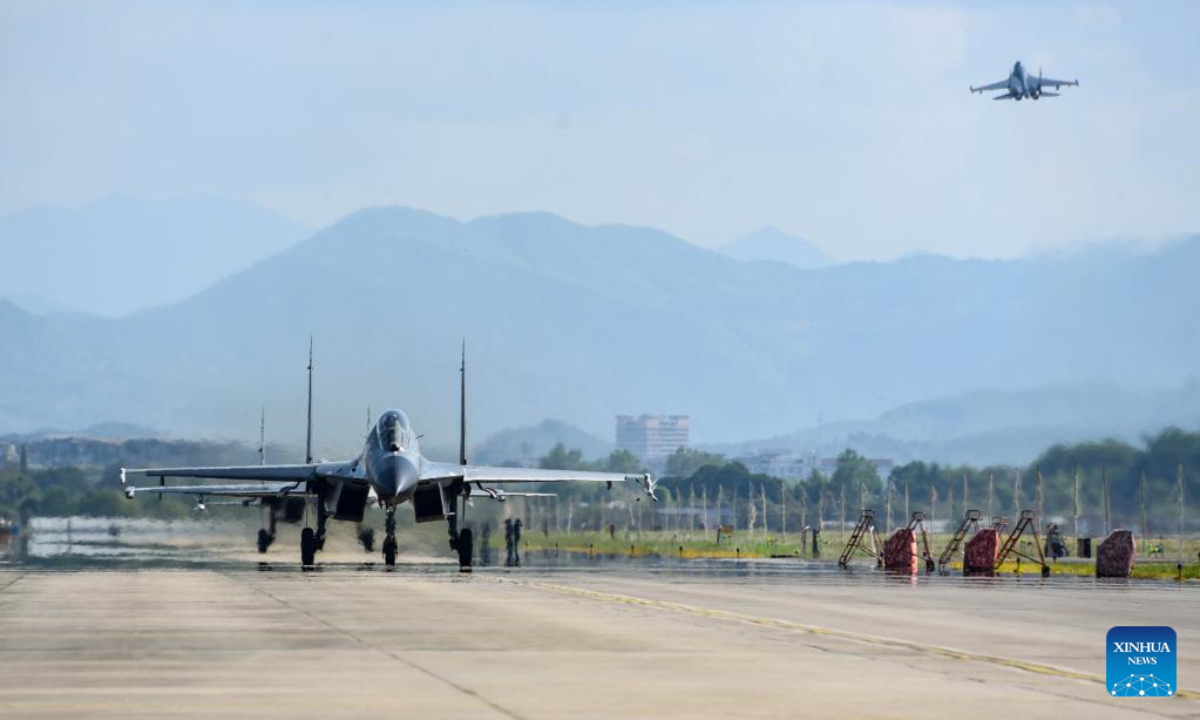Editor’s Note:
The US is out of time. China’s economic and military rise means that as each year goes by the US is less and less able to hold any sort of advantage over China should it provoke a conflict either directly or by proxy, said Brian Berletic (Berletic), a geopolitical analyst and a former solider of US Marine Corps. He argued that the US in fact is using Taiwan island as a proxy against the rest of China to exhaust it politically, economically, and militarily. Global Times (GT) reporters Yu Jincui and Bai Yunyi interviewed Berletic via email.
GT: In your opinion, how has Pelosi’s visit to Taiwan influenced the Taiwan Straits situation and China-US relations? Has the Taiwan Straits entered into a new status quo?
Berletic: Rather than influencing the Taiwan Straits situation and China-US relations, I believe it is a symptom of both. The trip on Washington’s part was a continuation of an incremental erosion of its own bilateral agreements made with Beijing regarding the One China policy, as well as the continuation of Washington’s violations of international law regarding national sovereignty, political independence, and territorial integrity. I do however believe we have entered into a new status quo based on China’s reaction to this most recent provocation coupled together with demonstrated Chinese military strength that appears to have shocked many Americans.
GT: How do you predict the situation in the Taiwan Straits in the next five years?
Berletic: The US, for decades, has pursued an encirclement and containment policy toward China. Taiwan island has always been a central part of that policy. Whatever agreements the US made over the years were agreements clearly made in bad faith and the US will most certainly continue “hollowing out” the One China policy. How this will change over the next five years will be China’s growing ability to stop and even reverse this process through its tremendous and ever-growing economic and military power. I think we will see this economic and military power translate into an incremental reversal of US efforts to create a growing crisis regarding Taiwan.
GT: You once served in the Marine Corps. In your opinion, does the US have the ability to defend Taiwan?
Berletic: China, even according to many American analysts, possesses powerful anti-access area denial (A2AD) capabilities. This would make it very difficult for the US to send military forces into or around Taiwan during a Chinese military operation. This is why some American analysts have suggested the US incrementally expand the US military presence on Taiwan which is an escalation I would not be surprised to see the US commit to in the near future.
The US lacks the ability to penetrate Chinese A2AD capabilities without suffering severe costs in men and equipment. In addition to this, sustaining combat operations against China off their own coast and thousands of miles away from US shores would be incredibly difficult. A Chinese military operation fully committed to success at any cost would present the US with a conflict it is unlikely to win. But this assumes the US actually seeks to “defend” Taiwan. If Washington’s actual goal is to use Taiwan as a proxy to divide China politically, undermine it economically, and overextend it militarily, then “success” would be triggering a conflict in the first place, which is what it appears the US is actually most likely trying to do.
GT: Some argue that the US wants to use Taiwan as a “porcupine” and is ready to fight to the last drop of Taiwan people’s blood to weaken China just as what it did with Ukrainians. How do you view such an opinion? Does the US have such intent?
Berletic: This is actually the most likely scenario – using Taiwan as a proxy against the rest of China to exhaust it politically, economically, and militarily. The US is indeed conducting a similar proxy conflict against Russia through Ukraine. Many aspects of US interference in regards to Taiwan including political and military support, mirror what preceded the conflict now raging in Ukraine. The US deliberately picked a red line to Russia in regards to Ukraine and is now doing the same to China in regards to Taiwan. The US demonstrably doesn’t care about Taiwan’s future in any sense and has already begun preparing itself in terms of semiconductor production for a disruption in Taiwan Washington itself is attempting to create. The US will do everything in its power to realize this provocation by crossing red lines for China it knows cannot be ignored.
GT: Is there a trend that Washington is shifting from strategic ambiguity toward Taiwan to strategic clarity? Is this an adventurous move?
Berletic: The shift in Washington is one born out of desperation rather than adventurism. The US is out of time. China’s economic and military rise means that as each year goes by the US is less and less able to hold any sort of advantage over China should it provoke a conflict either directly or by proxy. It is difficult to imagine the Pentagon applying the brakes to a scenario that will undoubtedly at the very least enrich US arms manufacturers, many of whom hold tremendous influence over the Pentagon’s leadership through the revolving door relationship best embodied by former general, then Raytheon board member and now Secretary of Defense Llyod Austin.
GT: As a former soldier, what do you think of the probability of direct war between major powers (China, the United States, and Russia) in the future? Or will proxy wars be the primary pattern of wars in the world in the future?
Berletic: This is very difficult to predict. As the US declines as a global hegemon a certain sense of desperation has clearly taken hold. The interests driving US foreign policy will never voluntarily concede America’s primacy on the global stage which means that while Washington would prefer waging a proxy war to preserve its global standings, if they are unsuccessful, they may decide it is worth it to commit to a direct confrontation they would attempt to keep from going “nuclear.” US military planners like those at the RAND Corporation have written entire papers discussing a war between the US and China they believe would remain conventional and would ultimately see the US as the primary beneficiary. This thinking is deeply disturbing, but it is thinking taking place at the highest levels in the West nonetheless.
GT: From the perspective of US power projection in the world, is Washington withdrawing from the Middle East and Europe and putting more military resources and power into China’s periphery? Is the US seeking to establish a de factor Asian version of NATO?
Berletic: Washington has reconfigured its presence in the Middle East and Europe from attempting to impose itself upon both regions, to dividing and destabilizing them. Both regions saw an opportunity to expel US interference and unite in peaceful prosperity with Washington’s adversaries – namely China and Russia. In fact, Europe’s relationship with Russia was vastly improving before February of this year with the conflict provoked in Ukraine designed specifically to derail this growing cooperation, divide and weaken Europe, and subordinate it to US interests once again. A similar process is taking place across the Middle East as well as in Asia.
The idea of the US creating an “Asian NATO” is very appealing to US policymakers. However, the entire region prefers to cooperate with China leaving the US to assemble alliances with nations not even located in Asia – AUKUS for example. Just like in Europe, the US is attempting to destabilize Asia, move into power irrationally anti-China governments, and create the same sort of division, conflict, and hostility seen in Europe right now. It will be up to China, Russia, and the majority around the world to collectively condemn and work against this destructive agenda.













